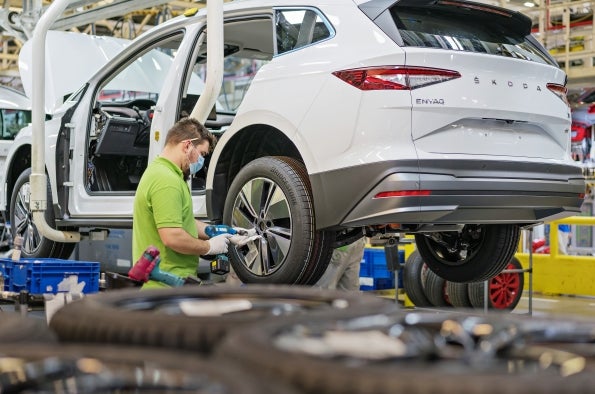
Skoda says it has partially relocated cable harness production from Ukraine to the Czech Republic in close coordination with the affected suppliers, after supplies from western Ukraine were disrupted by war.
The car manufacturer also said it is securing additional production capacity in Morocco and other countries. The aim of the measures is to safeguard the company against potential supply bottlenecks and disruptions to the supply chain in the future. The arrangements will allow for current production volumes to be doubled if necessary, Skoda said.

Discover B2B Marketing That Performs
Combine business intelligence and editorial excellence to reach engaged professionals across 36 leading media platforms.
Karsten Schnake, Board Member for Purchasing at Skoda Auto said: “At Skoda Auto, we have been working very closely with our partners over the past few weeks to minimise the impact of the war in Ukraine on the supply of cable harnesses. With great dedication, we managed to resume production in Ukraine within a short period and also significantly increase manufacturing capacities. I would like to thank the entire team and all the suppliers involved for this achievement. At the same time, I can assure our Ukrainian partners that we are and will remain fully committed to them. They have our utmost respect for continuing to supply us as the circumstances permit.”
Because of war-related supply bottlenecks, Skoda was forced to suspend production of the all-electric ENYAQ iV for eight weeks from 3 March due to a shortage of cable harnesses. With a view to restarting production as quickly as possible, the carmaker and its suppliers quickly began looking into duplicating the production of cable harnesses at other manufacturing plants in Europe and North Africa.
Skoda and PEKM Kabeltechnik managed to relocate part of the cable harness production from Ukraine to Mladá Boleslav within five weeks of the war starting. PEKM built the necessary production equipment in assembly halls provided by Skoda and manufacturing was gradually ramped up from the beginning of April. The production facilities are staffed by 35 women from the Ukrainian plant in Lviv, who are now training new employees. Cable harnesses for the Octavia, Kodiaq, Karoq and Superb model series will start ‘in the coming weeks’, Skoda said.
To be as well prepared as possible for potential supply bottlenecks in the future, Skoda has secured additional capacity from the company Kromberg & Schubert at the Moroccan plant in Kenitra near Rabat. In addition, Kromberg & Schubert has now increased the number of cable harnesses manufactured at its Ukrainian plant in Zhytomyr. The demand for cable harnesses for the production of the ENYAQ iV will be met in the future thanks to manufacturing at both locations – Zhytomyr in Ukraine and Kenitra in Morocco.
Skoda is also planning to duplicate the production of high-voltage cable harnesses required to charge electric vehicles, among other things. From the end of June, these will be manufactured in Romania. From September onwards, production from the plant in Khmelnyskyj, Ukraine, will also be duplicated after consultation within the Volkswagen Group: The cable harnesses for the Octavia and Superb models will then also be produced in Tangier, Morocco.
See also: Pressing issues for automotive supply chains






